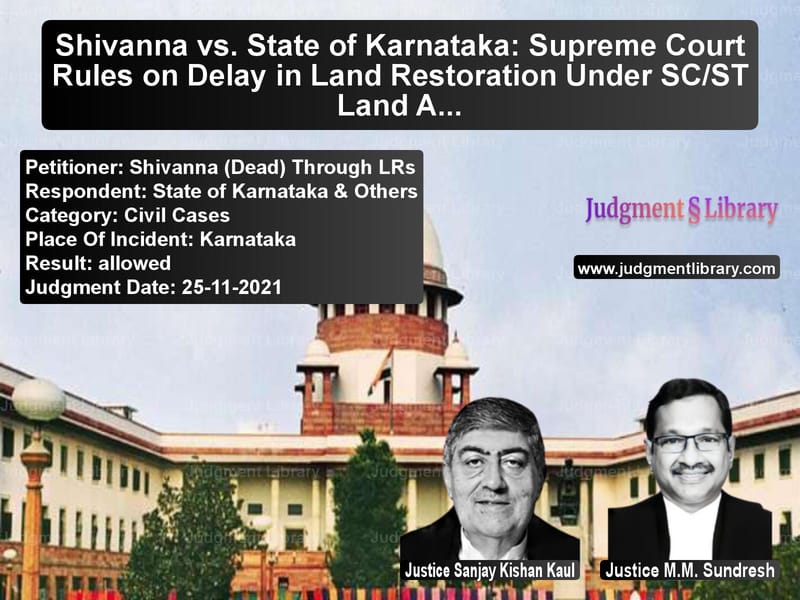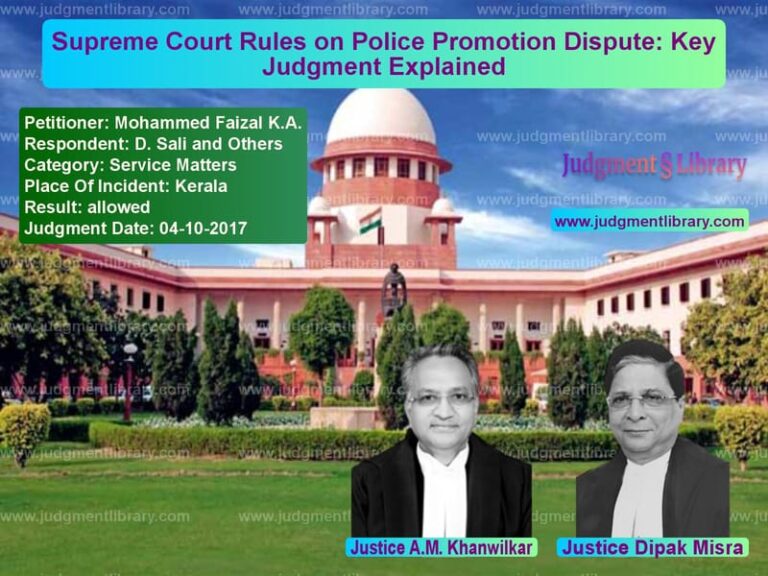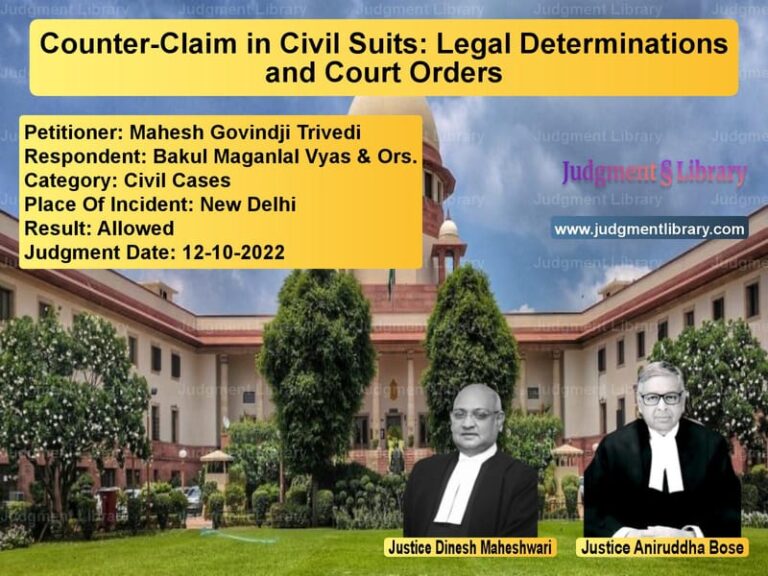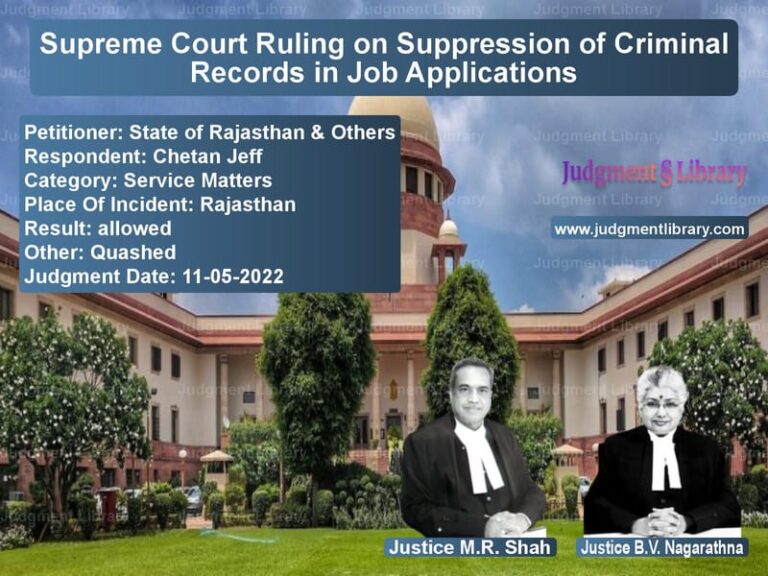Shivanna vs. State of Karnataka: Supreme Court Rules on Delay in Land Restoration Under SC/ST Land Act
The case of Shivanna (Dead) Through LRs vs. State of Karnataka & Others concerns the restoration of land granted to Scheduled Caste (SC) individuals under the Karnataka Scheduled Castes and Scheduled Tribes (Prohibition on Transfer of Certain Lands) Act, 1978. The Supreme Court examined whether a legal heir of the original grantee could seek annulment of an old land transfer decades after it occurred.
Background of the Case
The Karnataka Scheduled Caste and Scheduled Tribes (Prohibition on Transfer of Certain Lands) Act, 1978 (hereinafter referred to as the “Act”) was enacted to prevent the alienation of land granted to SC/ST beneficiaries. The Act, effective from 1st January 1979, aimed to protect these communities from losing their allotted lands through sales to non-SC/ST individuals.
The present dispute relates to two acres of land granted to Late Junjappa, an SC individual, on 7th June 1941 in Karnataka. The land was transferred through two sale deeds:
- On 20th December 1971, one acre was sold to the appellant, Shivanna.
- On 20th December 1972, the remaining one acre was sold to a third party, who later transferred it to Respondent No.5 on 20th June 1974.
The Act came into force on 1st January 1979, prohibiting such transactions. However, no claim was made by the original grantee or his heirs for decades. It was only on 4th October 2000 that the grandson of the original grantee (Respondent No.4) filed an application before the Assistant Commissioner, seeking restoration of the land.
Arguments by the Petitioner (Shivanna & Legal Representatives)
- The petitioners contended that Respondent No.4 had approached the authorities after an unreasonably long delay of over 21 years after the Act came into force.
- They argued that even if the transaction violated the rules, the claim should have been made within a reasonable timeframe.
- They raised the defense of adverse possession, asserting that they had been in continuous possession of the land for decades.
- The petitioners pointed out that the original grantee, his son, and his grandson (Respondent No.4) had remained silent for years and failed to challenge the transaction earlier.
Arguments by the Respondents (State of Karnataka & Heirs of Original Grantee)
- The respondents argued that the sale of land violated Rule 43(8) of the Mysore Land Revenue Code, which placed an absolute bar on the alienation of land granted to SC/ST beneficiaries.
- They contended that under the Act, any sale of such land was void, and the heirs of the grantee had the right to seek restoration at any time.
- Respondent No.4 claimed that the failure of the original grantee to challenge the transaction earlier did not extinguish the legal right to reclaim the land.
- They asserted that statutory provisions should be interpreted in a manner that furthers the objective of protecting SC/ST communities from land dispossession.
Supreme Court’s Observations
The Supreme Court, comprising Sanjay Kishan Kaul and M.M. Sundresh, made several key observations:
- Impact of Rule 43(8): The Court acknowledged that the sale of land was in violation of Rule 43(8) of the Mysore Land Revenue Code, which prohibited alienation of such land.
- Extraordinary Delay in Claim: The Court highlighted that Respondent No.4 attained majority in 1985 but waited until 2000 to file a claim. Neither his father nor grandfather had taken legal action during their lifetime.
- Principle of Delay and Laches: The Court applied the doctrine of laches, stating that even if a strict limitation period did not apply, an unreasonable delay in asserting rights could not be condoned.
- Reliance on Previous Rulings: The Court cited precedents where restoration claims filed decades after the transaction were rejected due to delay.
The Court noted:
“The lapse of time itself should not defeat the valuable right when the sale by his grandfather is contrary to Rule 43(8) of the Code and in the teeth of the subsequent legislation. However, given the extraordinary time period which has elapsed, we must take a different view.”
Key Precedents Cited
The Court referred to the following judgments:
- Vivek M. Hinduja & Ors. v. M. Ashwatha & Ors. (2020) 14 SCC 228: Held that applications for restoration of land under the same Act must be filed within a reasonable time.
- Nekkanti Rama Lakshmi v. State of Karnataka (2020) 14 SCC 232: The Court ruled that a delay of 25 years in seeking restoration under the Act was unreasonable.
- Smith v. East Elloe Rural District Council (1956) AC 736: The judgment emphasized that legal orders, even if flawed, remain valid unless challenged within a reasonable timeframe.
Final Judgment
The Supreme Court ruled that:
- The claim for restoration of land was barred due to inordinate delay.
- The principle of laches applied, as Respondent No.4 and his predecessors failed to act for decades.
- The order of the Assistant Commissioner, which had invalidated the sale, was set aside.
- The land would continue to vest with the petitioners.
- The appeal was allowed, dismissing the claim for restoration.
Impact of the Judgment
This ruling carries significant implications for cases under the SC/ST Land Act:
- Importance of Timely Claims: Legal heirs of original grantees must assert their rights within a reasonable period.
- Protection Against Unreasonable Delays: The judgment prevents the reopening of old transactions decades after they occurred.
- Application of the Doctrine of Laches: Courts will not entertain claims where there has been excessive delay without justification.
- Recognition of Bona Fide Purchasers: The ruling ensures that those who have been in possession of land for extended periods are not arbitrarily dispossessed.
Conclusion
The Supreme Court’s ruling in Shivanna vs. State of Karnataka sets an important precedent on the applicability of the SC/ST Land Act. While the Court acknowledged the protective nature of the Act, it held that such protections cannot be invoked indefinitely, especially when the delay in filing a claim is excessive. The judgment balances the rights of SC/ST grantees with the principle of legal certainty for long-standing land transactions.
Petitioner Name: Shivanna (Dead) Through LRs.Respondent Name: State of Karnataka & Others.Judgment By: Justice Sanjay Kishan Kaul, Justice M.M. Sundresh.Place Of Incident: Karnataka.Judgment Date: 25-11-2021.
Don’t miss out on the full details! Download the complete judgment in PDF format below and gain valuable insights instantly!
Download Judgment: shivanna-(dead)-thro-vs-state-of-karnataka-&-supreme-court-of-india-judgment-dated-25-11-2021.pdf
Directly Download Judgment: Directly download this Judgment
See all petitions in Property Disputes
See all petitions in Landlord-Tenant Disputes
See all petitions in Succession and Wills
See all petitions in Judgment by Sanjay Kishan Kaul
See all petitions in Judgment by M.M. Sundresh
See all petitions in allowed
See all petitions in supreme court of India judgments November 2021
See all petitions in 2021 judgments
See all posts in Civil Cases Category
See all allowed petitions in Civil Cases Category
See all Dismissed petitions in Civil Cases Category
See all partially allowed petitions in Civil Cases Category







